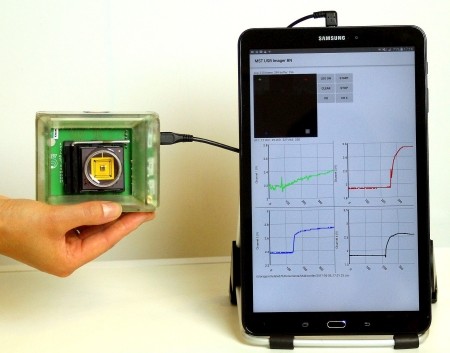Metabolite measurement device inspired by Star Trek

Researchers from the University of Glasgow have announced an exciting new development in their ‘multicorder’ project, which seeks to make rapid, sophisticated medical diagnostics more accessible to people around the world.
Inspired by Star Trek’s famous tricorder, used by medics within the program to make quick and accurate diagnoses, the researchers’ new device pairs a handheld sensor with a smartphone app and measures the levels of various metabolites in fluid samples from patients. Their work has been published in the journal Biosensors and Bioelectronics.
Metabolites are small molecules found in fluids from the human body, which scientists can measure or monitor in order to keep track of general heath or the progression of specific diseases. While metabolites can currently be measured by existing processes such as nuclear magnetic resonance and hyphenated mass spectrometry techniques, both approaches are expensive and require bulky equipment that can be slow to offer diagnostic results.
By contrast, the researchers’ new device is built around a new form of complementary metal oxide semiconductor (CMOS) chip, which is inexpensive to produce and often used in imaging devices. The chip is smaller than a fingertip and is divided into multiple reaction zones to detect and quantify four metabolites simultaneously from body fluid such as serum or urine.
“This new handheld device offers democratisation of metabolomics, which is otherwise confined within the laboratory, and offers a low-cost alternative to study complex pathways in different diseases,” said Professor Mike Barrett, co-investigator on the project.
The ability to rapidly detect and quantify multiple metabolite biomarkers simultaneously makes the device particularly useful in cases of heart attack, cancer and stroke, where rapid diagnosis is vital for effective treatment. It can also be operated via any Android-based tablet or smartphone, which provides data acquisition, computation, visualisation and power.
“We have been able to detect and measure multiple metabolites associated with myocardial infarction, or heart attack, and prostate cancer simultaneously using this device,” said Dr Samadhan Patil, lead author on the paper. “This device has potential to track progression of the disease in its early phase and is ideally suited for the subsequent prognosis.”
“Handheld, inexpensive diagnostic devices capable of accurately measuring metabolites open up a wide range of applications for medicine, and with this latest development we’ve taken an important step closer to bringing such a device to market,” added Professor David Cumming, principal investigator on the project. “It’s an exciting breakthrough and we’re keen to continue building on the technology we’ve developed so far.”
Novel 3D bioprinter can replicate human tissue
Biomedical engineers have invented a 3D printing system capable of fabricating structures that...
Medical gauze can identify shark species following attacks
Injury dressings found in first-aid kits can be used to identify shark species involved in bite...
Liquid biopsy analysis helps improve cancer monitoring
Researchers have developed a liquid biopsy method that sequences and analyses DNA fragments...




